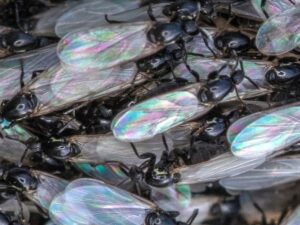Get Rid of Cluster Flies
Prices from £90 +VAT
To get rid of cluster flies from your home or business premises call 0800 026 0308

Guarantee
We don’t guarantee insecticide treatment for flies.
- The treatment won’t eliminate a fly infestation but will kill the vast majority of flies present at the time.
 Cluster flies look similar to house flies, however their behaviour is very different as they’re sluggish and don’t buzz around. They only invade homes when they’re looking for somewhere dry and sheltered to hibernate. They aren’t a health hazard as they don’t lay their eggs in food or waste.
Cluster flies look similar to house flies, however their behaviour is very different as they’re sluggish and don’t buzz around. They only invade homes when they’re looking for somewhere dry and sheltered to hibernate. They aren’t a health hazard as they don’t lay their eggs in food or waste.
Why are cluster flies a nuisance?
- Cluster flies hibernate in large numbers, with hundreds of flies forming clusters in upstairs rooms, roof spaces, wall cavities and window sash boxes.
- They go into hibernation gradually over several days. In early autumn they start to gather in large numbers on sunny, light-coloured outside walls. Eventually they find their way inside by squeezing through crevices and cracks around tiles, window frames or under the eaves.
- Once a hibernation site is selected, the descendants use the same site year after year because of genetic memory.
If you have a cluster fly problem you’ll notice dead, dying or lazy flies around windows or in roof spaces in the autumn or on warm days during late winter and early spring.
Preparation you must undertake prior to treatment
- All surfaces such as interior walls, ceilings, windows and frames must be clean and dust-free so that the technician can carry out the treatment efficiently.
- Ensure cutlery, food, clothes, towels, toothbrushes etc are covered.
Aftercare
- Immediately after treatment let the spray dry; don’t clean or wipe up any puddles.
- Reduce the humidity by opening windows and increase the heat to allow the treatment to work most effectively.
- Don’t touch the treated surfaces or let pets into the treated area until dry.
- If you do get the insecticide on your skin wash it off immediately.
- Residual insecticide lasts 1 to 3-months.
How our treatment works
 Fogging is the best way to get rid of cluster flies as it allows the insecticide to penetrate into the cracks where flies may be hibernating.
Fogging is the best way to get rid of cluster flies as it allows the insecticide to penetrate into the cracks where flies may be hibernating.
Dying flies may be seen for up to 4-weeks after treatment as it depends on temperature and how much insecticide they have absorbed.
Products we use
The technician will state which insecticide has been used on the report they give you after they have completed the treatment. Click the product to access its safety data sheet. All insecticides are biodegradable, almost odourless, non-tainting and don’t corrode or stain.
Insecticide spray
Insecticide powder
Insecticide fogging
Electric Fly Killers (EFKs)
An electric fly killer (EFK) can significantly reduce, but not solve, the problem ongoing.
Buy an electric fly killer (EFK) from our online shop

Fly-Shield 1
Designed for areas up to 90 sqm
Attracts and traps flying insects on a UV stabilised glue board.
1 x 18w shatter resistant lamps
W 34.5 x H 25.5 x D 12 cm
£104.80 including VAT and delivery
Facts about cluster flies
Adult cluster flies feed on flower nectar, plant sap, fruits and other organic matter. They live for 3 to 4-years.
From late spring and throughout the summer, cluster flies live and breed in fields. The females lay their eggs in the soil. When they hatch the maggots seek an earthworm host. They penetrate its body, continuing to develop until they become full-grown which takes 2 to 3-weeks. They emerge and start to reproduce. Up to 4-generations may be produced over a summer.
In early autumn cluster flies start to look for dry, sheltered places to hibernate over winter. They go into hibernation gradually over several days, starting with hundreds of flies gathering on sunny, light-coloured outside walls. They find their way inside by squeezing through crevices and cracks around tiles, window frames or under the eaves. The flies form clusters in upstairs rooms, roof spaces, wall cavities and window sash boxes. The flies emerge from hibernation in mid-spring.
Cluster flies return to the same hibernation site every year. Their descendants will continue to use the same site year after year because of genetic memory.
